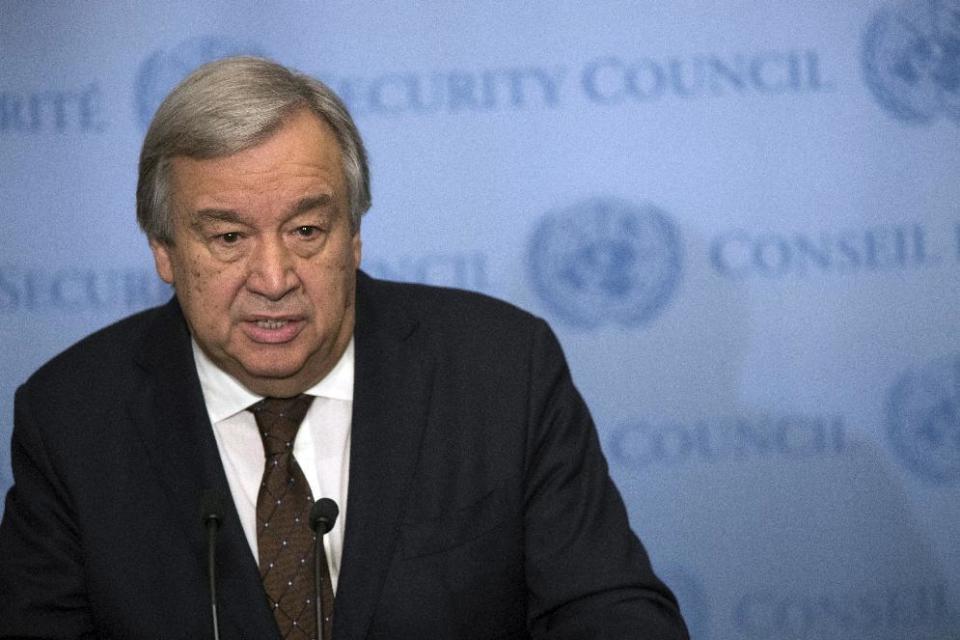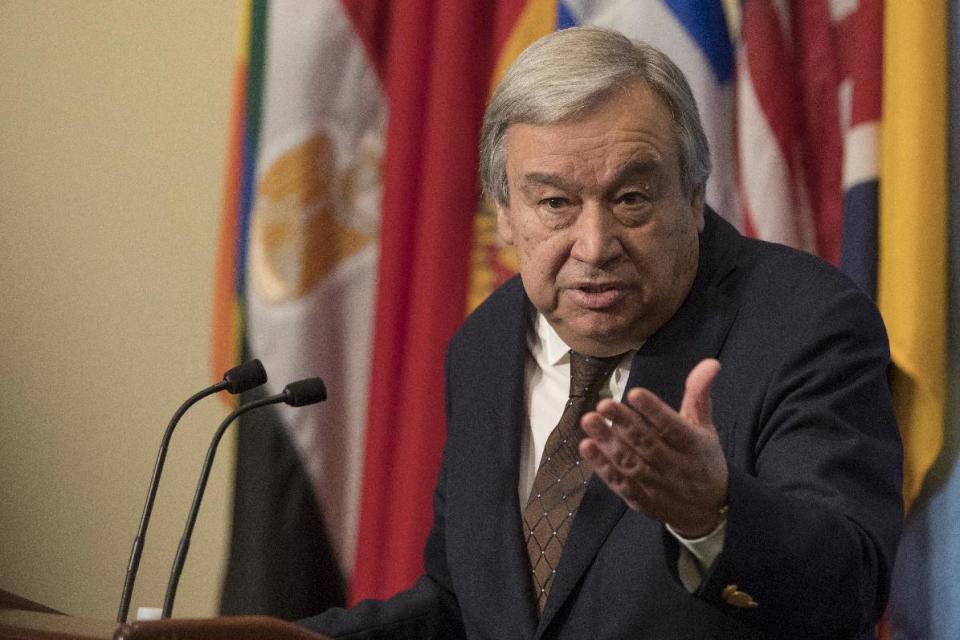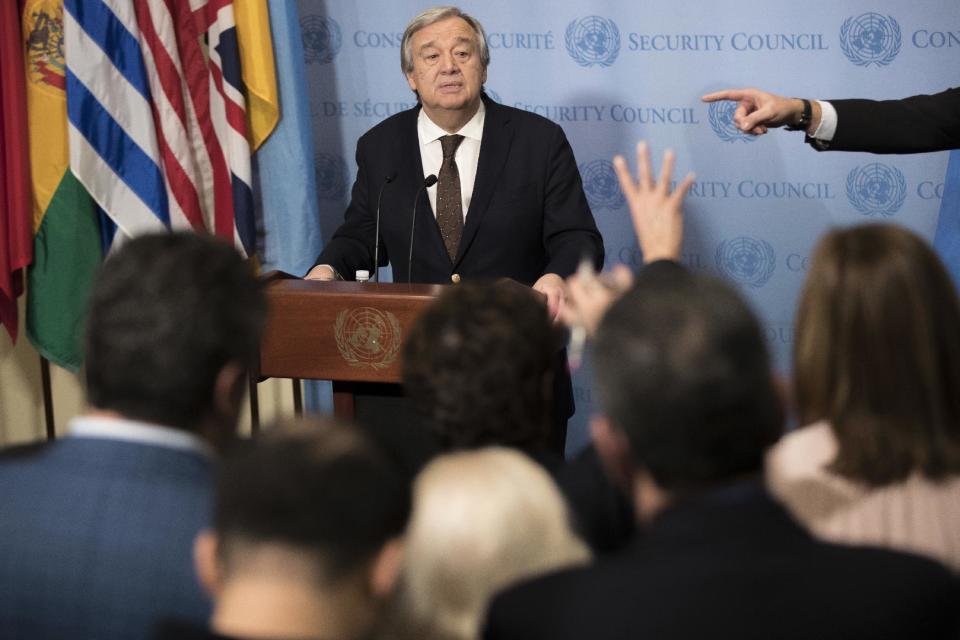Experts: UN faces test in response to Trump refugee plan
GENEVA (AP) — The United Nations is facing a challenge over how to respond to U.S. President Donald Trump's controversial decisions to suspend entry for refugees and visitors from seven predominantly Muslim countries to the United States.
Experts say the global body is wedged between its bedrock ambitions to help the world's downtrodden and persecuted, its need to maintain funding from its biggest donor, and a new effort to get other countries to take up the slack left by the United States — a traditional beacon for people fleeing war.
In an executive order last week, citing security concerns, Trump suspended the U.S. refugee admission program for 120 days and imposed a 90-day ban on U.S. entry for citizens of Iran, Iraq, Libya, Somalia, Syria, Sudan and Yemen. Protests erupted at many airports across the United States, and many families were left in limbo.
It took several days for the U.N. response to gel, and gradually harden.
U.N. Secretary-General Antonio Guterres acknowledged a fragmented initial response while he was attending a conference in Africa when Trump's announcement landed, saying Wednesday that "what lacking was the capacity to have a comprehensive approach to the problem."
Speaking to reporters in New York, he used his clearest terms yet.
"I think that these measures should be removed sooner rather than later," he said. "I think that those measures violate our basic principles, and I think that they are not effective if the objective is to really avoid terrorists to enter the United States."
Guterres' tone has been complicated by the fact that Trump's entourage and administration have taken a tough line against the United Nations, with rumblings that Washington could even cut its generous funding or seek to pull out of crucial U.N. priorities like the Paris agreement to fight climate change.
Asked how the U.N. was strategizing amid such issues, Guterres toed a fine line.
"All complicated things have an easy answer, and the answer is to be firm in assessing our principles and open in engaging in constructive dialogue," he said.
The financial stakes are very high for the United Nations. The United States pays 22 percent of the U.N.'s regular budget and over 28 percent of the costs of its far-flung peacekeeping operations. It also sends large contributions to U.N. agencies like the World Food Program, the children's agency UNICEF and the World Health Organization, which has been at the center of the fight against the Zika virus.
On the campaign trail, Trump rallied a base with strong misgivings about the U.N., and in December tweeted cryptically that "things will be different" at the U.N. after Jan. 20 — the day he took office. The U.N. had "such great potential," he wrote, but was now it's "just a club for people to get together, talk and have a good time. So sad!"
The task is perhaps most delicate for the U.N. High Commissioner for Refugees, which says 65 million people are displaced worldwide by conflict and persecution — the highest number since World War II.
The order "makes the job of the United Nations, and UNHCR in particular, very, very difficult," said Michael Williams, a distinguished fellow at the Chatham House think tank in London and a former U.N. undersecretary-general.
"Mr. Guterres will be moving with a deliberate pace, and not wishing to inflame the relationship with the U.S.," he said.
Philippe Bolopion, deputy director for global advocacy at Human Rights Watch, urged Guterres to take a "clear stand."
"With President Trump's scare-mongering against refugees and citizens of seven Muslim-majority countries, Guterres is now facing a major test," he said.
In a statement Tuesday, Guterres said countries have the right, even the obligation, to avoid infiltration "by members of terrorist organizations." But he said they cannot discriminate on grounds of religion, ethnicity, or nationality: "Blind measures, not based on solid intelligence, tend to be ineffective as they risk being bypassed by what are today sophisticated global terrorist movements."
Still, the secretary-general did not mention the United States by name, and said refugees are finding more and more borders closed around the word, in violation of the protection they are entitled to under international refugee law.
The United States is UNHCR's single largest donor, contributing over $1.5 billion last year — over four times more than the No. 2 donor, the European Union. The U.S. accounts for more than one fourth of all funding for the U.N.-affiliated International Organization for Migration.
UNHCR has spoken out firmly before. When Hungary was closing its borders 16 months ago to prevent the entry to thousands of refugees from Syria and beyond, it insisted the Hungarian government had "legal and moral obligations" to allow "unimpeded access" for people in need.
The refugee agency is honing its response to Trump's ban as the days wear on. An initial statement Saturday praised America's "long tradition" of protection for people fleeing conflict, expressed hope for continued U.S. leadership, and pledged to work with the new administration.
On Wednesday, during a tour of the bombed-out Syrian city of Aleppo, UNHCR chief Filippo Grandi said: "Look at these ruins. The ruins of this war. This is what refugees from Syria, who are now denied entry (to the United States), have fled from."
"And it is not just here in Aleppo, although this is massive. Refugees from Somalia, refugees from Yemen, refugees from Iraq: they all flee from destruction like this, from devastation like this," Grandi said in a video message. "How can we turn them back? How can we not consider giving them protection?"
UNHCR says the U.S. could have resettled 20,000 people over the 120-day suspension, based on the average rate over the past 15 years.
While most of the world's refugees are in countries neighboring war zones, the U.S. currently takes the bulk of "resettling" refugees — a process involving about 230,000 of the most vulnerable people, IOM spokesman Leonard Doyle said.
On Wednesday, five independent experts with the U.N. human rights office, which tends to speak out more vigorously than other U.N. bodies, said Trump's order against people of seven countries was "clearly discriminatory" and violates United States' international human rights obligations to not turn away people with a right to protection.
Williams, of Chatham House, said Trump was trying to get more out of other countries.
"Particularly with UNHCR, the U.S. has punched way above its weight, and he's trying to even it out," he said. "In that regard, I'm not without sympathy."
Doyle, at the IOM, urged other, farther-flung countries to show "a modicum of the same degree of openness that the U.S. has shown."
"Let's have it from the Latin Americans, let's have it from the Asians. Let the Europeans show a bit more generosity," Doyle told a U.N. news conference Tuesday.
"Probably the most important thing is for other countries to step forward and say, 'We will take these people who have been approved and cleared,'" in the U.S. resettlement process, he added. "Why not?"
___
Lederer reported from New York.





